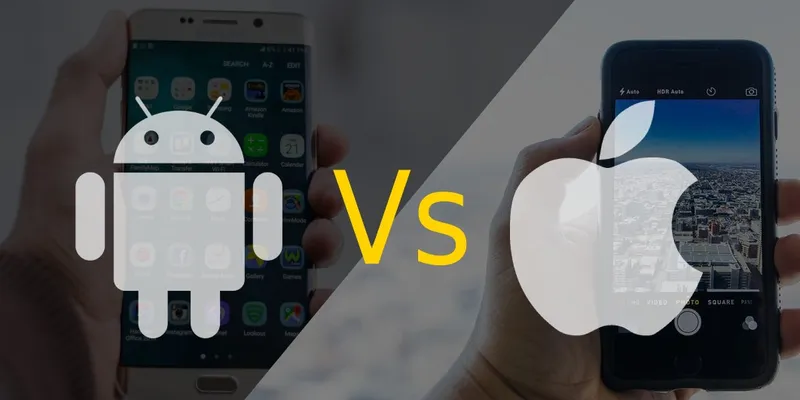

iOS or Android: which platform should be chosen by startups?
The ideal approach is to know your business behavior, type of targeted audience, geographical area, time frame, and various other factors.

As per today’s market scenario, launching an application has become the crucial requirement for the start-ups or business individuals, but which one should you build for depends on various factors or circumstances pertained to the specific business necessities.
The ideal approach is to know your business behavior, type of targeted audience, geographical area, timeframe, and various other factors. These factors can vary from business to business. So, analyze your business structure first and then, take your final decision.
Some factors are uncovered down so as it can help you out in choosing the right platform for your business app:
1. Know your audience
Before getting your app developed, it is crucial to know your target audience first. In order to find your target audience, you also need to know your goals apparently. For instance, what type of application you are getting developed and what services you will offer through your app.
Well, knowing your target audience is totally a long process but you can perform research for basic demographics and behavioral patterns of your actual audience such can be gender, age group, education, interests, income, attitude, and beliefs etc.
Such information will make you easy to identify the device what your targeted audience prefer. This will demand more efforts but seriously, though this way, you be able to focus on the precise audience.
2. Go with your budget
When you upload your app on Google Play, the platform charges $25 for every app registration. If you go with Apple's app, you have to pay $99 for a yearly license that allows the unlimited number of apps across the all operating system.
Android apps typically cost you a big amount because you need to develop for numerous android versions. However, the cost of testing for Android devices may go lower as Apple's hardware comes at a premium cost. Hence, decide your application development as per your budget.
3. Make sure your market
If your market is in major developed countries like Europe, Asia Pacific, China, and America then, certainly you need to develop an iOS app because, in premium nations, you may find the large audience of premium smartphones. Similarly, go with android apps if your business takes place in emerging markets like Africa, South America etc.
So, make your app decision as per your business market or else you may get failed in sustaining your brand image in your targeted market.
4. Releasing & approval timeline
When your app is ready to release, you may find some difficulty with iOS apps but not with android apps. In case of iOS apps, it takes 2-3 weeks for releasing and approval process and there are higher chances of being rejected. So, if you can wait for almost a month then, go with the iOS platform.
On the other hand, Android will keep a smile on your face as it typically takes a one day or two days to get your application approved and the updates are also delivered within a matter of hours. Hence, for short time approval and release, Android apps are user-friendly apps to adopt.
5. Focus on revenue model
From a revenue point of view, it is well-known that iOS apps generate more revenue in comparison to android apps. As per the recent survey, the android apps generate merely 24 percent of the revenue generated by iOS apps.
Comparatively, the iOS platform has few users, but they are more willing to spend on their apps than Android apps which contains a large number of the user. This is the reason why iOS has the higher number of paid apps, whereas Android offers the higher number of advertising-based apps. Here, this monetization strategy can help you to choose the best-fit app platform.
6. Launching complexity
Development of Android apps is more complex than the iOS apps. Currently, there are more than seven versions of Android devices and all are in use. Also, there is a large array of Android devices and each one is with their own specifications.
iOS users are more loyal to keep their software updated. You can see that 80 percent of iOS users are using the same version, but you cannot find even 50 percent of Android user those are using the same version.
Hence, Android apps require more efforts while launching the app for a number of versions and devices. In contrast, iOS apps are more comfortable in this perspective.
7. Loyalty of users
Once, the smartphone user becomes an Apple user then, they love to stay with Apple products for a lifetime. There is a very rare chance to switch to the other vendor. It is more common that Android users will switch to iOS devices but not vice-versa.
Through iOS, you can target a market with high-end loyal customers and these customers have five times more purchasing power than Android customers. Although, you will be able to expose your product to a wider audience through Android apps. This is such a factor that helps you out to take a better decision.
8. App Features concern
Android offers more freedom to the app developers as it enables them for more access to the hardware and operating system itself. iOS does not support this feature as it comes with some file system restrictions. Android comes with a very user-friendly operating system that allows for easy customization.
Being an open source operating system, there are ‘mods’ of Android such as CyanogenMod or Paranoid Android that allows deeper access to the developers into the operating system.
9. Niche Specific
When you are planning to develop an app, your app niche matters a lot. If your app is all about general awareness, tutorial, or learning based then, certainly you will be able to grab a vast audience through android app. You will get the fewer audience through iOS. So, always keep in mind your app niche in which you are getting your app developed.
Conclusion
Ultimately, your decision should be built as per your basic business necessities like what works best for your business model. Here, all you need to keep in mind: the type of business app you are developing, the monetization model, the target market you are aiming for, user demographics, project timeframe, and budget.




